新概念第二册第课知识点总结
新概念第二册每课的语法重点整理

新概念第二册每课的语法重点整理第1课- 介词的用法:in, on, at 等表示时间、地点和方式的介词的用法和区别。
第2课- 被动语态: 被动语态的构成和用法,如何将主动句改写为被动句。
第3课- 不定代词:some, any, no, every等不定代词的用法和区别。
第4课- 动词的时态:一般现在时,一般过去时以及一般将来时的构成和用法。
第5课- 非谓语动词:动词不定式、动名词和分词的形式和用法。
第6课- 数量的表达:基数词和序数词,还有一些常见的数量词的用法。
第7课- 情态动词:can, could, may, might等情态动词的用法。
第8课- 连词的使用:and, but, or, so等连接词的用法和区别。
第9课- 名词的所有格:名词所有格的构成和用法,以及经典的名词所有格的错误用法。
第10课- 现在完成时:现在完成时的构成和用法,与一般过去时的区别。
第11课- 介词短语:介词短语作状语的用法和常见表达方式。
第12课- 虚拟语气:if条件句和虚拟语气的构成和用法。
第13课- 比较级和最高级:形容词和副词的比较级和最高级的构成和用法。
第14课- 状语从句:时间、地点、原因、条件等状语从句的引导词和用法。
第15课- 间接引语:直接引语和间接引语的转换和用法。
第16课- 冠词的使用:冠词a, an和the的用法和区别。
第17课- 时态的混合使用:不同时态的混合使用,如何表达不同的时间关系。
第18课- 直接引语:如何准确地引述他人的原文,注意引号和标点的使用。
第19课- 句型的使用:如何正确地使用倒装句、感叹句和祈使句。
第20课- 能愿动词:能愿动词的构成和用法,如何表达能力和意愿。
第21课- 主谓一致:主谓一致的原则和方法。
第22课- 介词的构成:介词形式的构成和用法,以及常见的介词短语。
第23课- 代词的使用:人称代词、物主代词和不定代词的用法和区别。
第24课- 婉转的表达:如何用委婉的方式表达意见、请求和建议。
新概念第二册各课的文法知识归纳
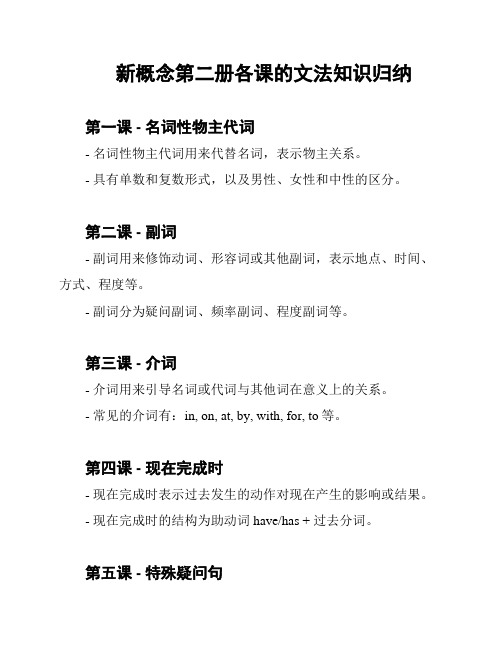
新概念第二册各课的文法知识归纳第一课 - 名词性物主代词- 名词性物主代词用来代替名词,表示物主关系。
- 具有单数和复数形式,以及男性、女性和中性的区分。
第二课 - 副词- 副词用来修饰动词、形容词或其他副词,表示地点、时间、方式、程度等。
- 副词分为疑问副词、频率副词、程度副词等。
第三课 - 介词- 介词用来引导名词或代词与其他词在意义上的关系。
- 常见的介词有:in, on, at, by, with, for, to等。
第四课 - 现在完成时- 现在完成时表示过去发生的动作对现在产生的影响或结果。
- 现在完成时的结构为助动词have/has + 过去分词。
第五课 - 特殊疑问句- 特殊疑问句用来询问特定的信息。
- 特殊疑问词包括:what, who, where, when, why, how等。
第六课 - 非谓语动词- 非谓语动词包括不定式、动名词和分词。
- 非谓语动词可以作为主语、宾语、主语补语、定语等。
第七课 - 定语从句- 定语从句用来修饰名词或代词,对其进行限定或说明。
- 定语从句的引导词有:关系代词who, whom, whose, which, that等。
第八课 - 时态和语态的转换- 时态和语态的转换可以根据需要进行变换,以更好地表达意思。
- 主要的时态包括一般现在时、一般过去时、一般将来时等。
第九课 - 虚拟语气- 虚拟语气用来表示与事实相反的假设、愿望、建议等。
- 虚拟语气主要包括过去将来时和过去完成时的虚拟形式。
第十课 - 反意疑问句- 反意疑问句用来请求确认或征求对方的意见。
- 反意疑问句的结构为主附句的倒装形式。
以上是对新概念第二册各课的文法知识的简要归纳,希望对您的学习有所帮助。
新概念二册第一课知识点文档版
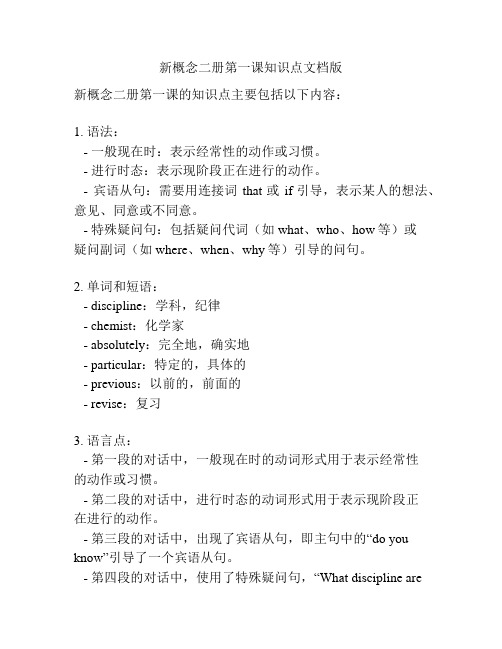
新概念二册第一课知识点文档版
新概念二册第一课的知识点主要包括以下内容:
1. 语法:
- 一般现在时:表示经常性的动作或习惯。
- 进行时态:表示现阶段正在进行的动作。
- 宾语从句:需要用连接词that或if引导,表示某人的想法、意见、同意或不同意。
- 特殊疑问句:包括疑问代词(如what、who、how等)或
疑问副词(如where、when、why等)引导的问句。
2. 单词和短语:
- discipline:学科,纪律
- chemist:化学家
- absolutely:完全地,确实地
- particular:特定的,具体的
- previous:以前的,前面的
- revise:复习
3. 语言点:
- 第一段的对话中,一般现在时的动词形式用于表示经常性
的动作或习惯。
- 第二段的对话中,进行时态的动词形式用于表示现阶段正
在进行的动作。
- 第三段的对话中,出现了宾语从句,即主句中的“do you know”引导了一个宾语从句。
- 第四段的对话中,使用了特殊疑问句,“What discipli ne are
you in?”表示对方的学科是什么。
新概念二册第一课主要通过对话形式展示了一般现在时、进行时态、宾语从句和特殊疑问句的用法。
通过学习这些知识点,可以帮助学习者进一步掌握英语语法和提高听说能力。
《新概念英语第二册》第一课笔记

n./pron. vt. n./pron. n./pron.
5. 主语 + 谓语 + 宾语 + 宾语补足语(宾补).
n./pron. vt.
n./pron. adj./to do sth.
e.g: He found this trip very exciting.
系动词:
1 . be 动词(am/is/are; was/were) 2. 感官动词(look, smell, taste, sound, touch, feel) 3. 保持(keep, stay, remain, maintain) 4. 变化(go, get, grow, turn, become)
4
4. enjoy doing sth. 喜欢做某事
9. pay attention to sth. 注意某物
enjoy oneself 玩得开心;过得愉快
10. in the end 最终;最后
= have fun/have a good time
11. bear sb./sth. 容忍某人/某事
5. have a conversation with sb. = talk with sb.
1. 上周我去剧院。_________________________________________. 2. 一青年男子与一青年女子坐在我的身后。
________________________________________________________. 3. 我非常生气。__________________________________________. 4. 我回头。_________________________________. 5. 最后,我忍不住了。 _____________________________________.
(完整版)新概念第二册每一课重点的总结
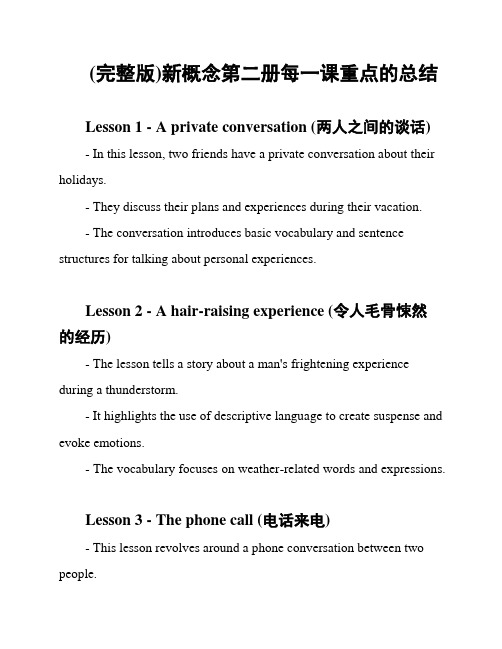
(完整版)新概念第二册每一课重点的总结Lesson 1 - A private conversation (两人之间的谈话)- In this lesson, two friends have a private conversation about their holidays.- They discuss their plans and experiences during their vacation.- The conversation introduces basic vocabulary and sentence structures for talking about personal experiences.Lesson 2 - A hair-raising experience (令人毛骨悚然的经历)- The lesson tells a story about a man's frightening experience during a thunderstorm.- It highlights the use of descriptive language to create suspense and evoke emotions.- The vocabulary focuses on weather-related words and expressions.Lesson 3 - The phone call (电话来电)- This lesson revolves around a phone conversation between two people.- The dialogue also includes expressions for making suggestions and giving advice.Lesson 4 - A famous monastery (一座著名的修道院) - The lesson describes a visit to a famous monastery.- It introduces vocabulary related to religious buildings and their surroundings.- Additionally, it provides practice in forming questions and giving short answers.Lesson 5 - A trip to Australia (澳大利亚之行)- In this lesson, a young girl talks about her trip to Australia.- Vocabulary related to travel, geography, and animals is presented.Lesson 6 - A rainy Saturday (一个雨天的星期六)- The lesson portrays a girl's activities on a rainy Saturday.- It introduces vocabulary relevant to hobbies and leisure activities.- The use of present continuous tense is emphasized to describe ongoing actions.Lesson 7 - Money, money, money! (金钱,金钱,金钱!)- This lesson explores the influence of money on people's lives.- It introduces vocabulary related to finance, business, and personal finances.- The dialogue highlights the use of modal verbs for making suggestions and giving advice.Lesson 8 - Mr. Hiker (远足先生)- The lesson narrates Mr. Hiker's experience hiking in the mountains.- Vocabulary related to nature, camping, and hiking is presented.- The past simple tense is practiced to describe past events.Lesson 9 - No parking (禁止停车)- This lesson focuses on the concept of parking restrictions.- Vocabulary related to road signs, transportation, and rules is introduced.Lesson 10 - Cycling for charity (骑自行车为慈善事业)- The lesson discusses a charity event involving cycling.- Vocabulary related to sports, charity, and participation in events is presented.- The dialogue emphasizes the use of phrasal verbs and expressions related to physical activities.Lesson 11 - Adventure sports (冒险运动)- In this lesson, different adventure sports are introduced and discussed.- Vocabulary related to extreme sports, risk-taking, and outdoor activities is presented.- The lesson also focuses on the use of present perfect tense to describe past experiences.Lesson 12 - Life in a big city (大城市的生活)- The lesson describes the advantages and disadvantages of living in a big city.- It introduces vocabulary related to urban life, city services, and facilities.- The dialogue includes phrases for expressing opinions and preferences.[...continued...]。
新概念英语第二册笔记(全部96课全)
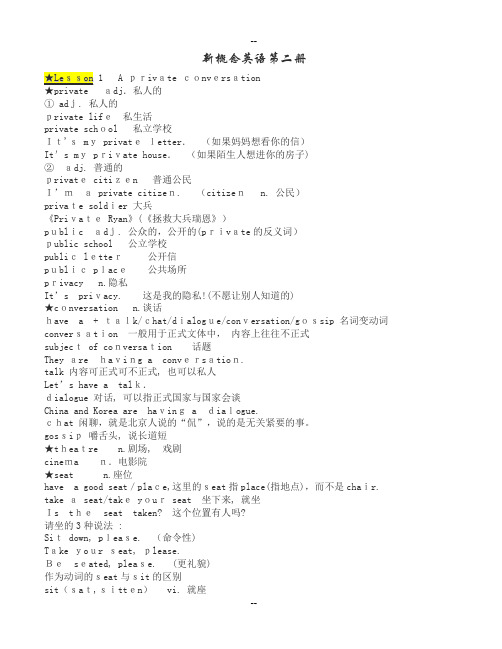
新概念英语第二册private conversationadj.私人的① adj. 私人的private life私生活private school 私立学校It's my privateletter.(如果妈妈想看你的信)It's my private house.(如果陌生人想进你的房子)②adj. 普通的private citizen 普通公民I’ma private citizen. (citizen n. 公民)private soldier 大兵《Private Ryan》(《拯救大兵瑞恩》)public adj. 公众的,公开的(private的反义词)public school 公立学校public letter公开信public place公共场所privacy n.隐私It’s privacy. 这是我的隐私!(不愿让别人知道的)★conversation n.谈话have a + talk/chat/dialogue/conversation/gossip 名词变动词conversation 一般用于正式文体中,内容上往往不正式subject of conversation 话题They are having a conversation.talk 内容可正式可不正式, 也可以私人Let’s have a talk.dialogue 对话, 可以指正式国家与国家会谈China and Korea are having a dialogue.chat 闲聊,就是北京人说的“侃”,说的是无关紧要的事。
gossip嚼舌头, 说长道短★theatre n.剧场, 戏剧cinema n.电影院★seat n.座位have a good seat/place,这里的seat指place(指地点),而不是chair. take a seat/take your seat 坐下来, 就坐Is theseat taken? 这个位置有人吗?请坐的3种说法 :Sit down, please. (命令性)Take your seat, please.Beseated, please. (更礼貌)作为动词的seat与sit的区别sit(sat,sitten)vi. 就座He is sitting there. 他坐在那儿。
新概念英语第二册第一课知识点总结

•lesson 1 A private conversation •grammar:1. past tense一般过去时2. adv. 副词的使用•wordsprivate adj. 私人的 (personal) 私信(公) a private letter•私家车a private car私事private affairs私立学校private school私生活private life私底下in privateseatvt 使…….坐下make sentence: 他让我坐下seat sbseat yourselfbe seated表达坐的方式重点:副词及副词用法3. angry adj. 生气的angrily adv. 生气的adj.+ly=adv.1)一般词尾+ly loudly rudely2) 词尾le变lycomfortable---comfortablygentle---gentlypossible---possiblysimple---________terrible---_________3)词尾y变i+lybusy---busilyeasy---easilyheavy---________angry---________hungry---_________lucky---___________happy---__________•他开心地去瑞安了。
•He went to Rui’an happily.•make sentence•angrily/rudely/hungrily/luckly/busily/stupidly/sadly Attention n. 注意稍加注意 ___________________________多加注意 ___________________________更多注意___________________________不注意___________________________You must pay attention _____ that girl.Attention passengers, the plane is leaving.汉译:______________________bear (bore, born)练习1. I left.I could not put up_____ him2.I can't ________忍受 you. You are so rude. Business n. 事, 生意business man :生意人do business: 做生意on business 出差It's none of your business. 不关你的事。
新概念二册各课重点
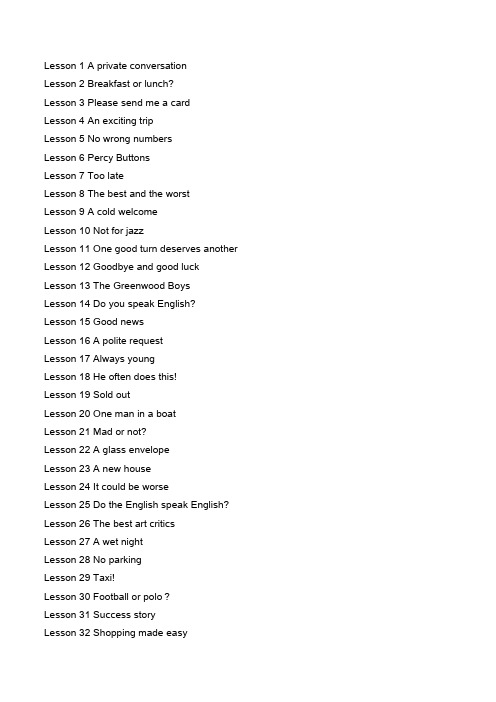
Lesson 1 A private conversationLesson 2 Breakfast or lunch?Lesson 3 Please send me a cardLesson 4 An exciting tripLesson 5 No wrong numbersLesson 6 Percy ButtonsLesson 7 Too lateLesson 8 The best and the worstLesson 9 A cold welcomeLesson 10 Not for jazzLesson 11 One good turn deserves another Lesson 12 Goodbye and good luck Lesson 13 The Greenwood BoysLesson 14 Do you speak English?Lesson 15 Good newsLesson 16 A polite requestLesson 17 Always youngLesson 18 He often does this!Lesson 19 Sold outLesson 20 One man in a boatLesson 21 Mad or not?Lesson 22 A glass envelopeLesson 23 A new houseLesson 24 It could be worseLesson 25 Do the English speak English? Lesson 26 The best art criticsLesson 27 A wet nightLesson 28 No parkingLesson 29 Taxi!Lesson 30 Football or polo?Lesson 31 Success storyLesson 32 Shopping made easyLesson 33 Out of the darknessLesson 34 Quick workLesson 35 Stop thief!Lesson 36 Across the ChannelLesson 37 The Olympic GamesLesson 38 Everything except the weather Lesson 39 Am I all right?Lesson 40 Food and talkLesson 41 Do you call that a hat?Lesson 42 Not very musicalLesson 43 Over the South PoleLesson 44 Through the forestLesson 45 A clear conscienceLesson 46 Expensive and uncomfortable Lesson 47 A thirsty ghostLesson 48 Did you want to tell me something? Lesson 49 The end of a dreamLesson 50 Taken for a rideLesson 51 Reward for virtueLesson 52 A pretty carpetLesson 53 Hot snakeLesson 54 Sticky fingersLesson 55 Not a gold mineLesson 56 Faster than sound!Lesson 57 Can I help you, madam?Lesson 58 A blessing in disguise?Lesson 59 In or out?Lesson 60 The futureLesson 61 Trouble with the HubbleLesson 62 After the fireLesson 63 She was not amusedLesson 64 The Channel TunnelLesson 65 Jumbo versus the policeLesson 66 Sweet as honey! Lesson 67 VolcanoesLesson 68 PersistentLesson 69 But not murder! Lesson 70 Red for danger Lesson 71 A famous clock Lesson 72 A car called bluebird Lesson 73 The record-holder Lesson 74 Out of the limelight Lesson 75 SOSLesson 76 April Fools' Day Lesson 77 A successful operation Lesson 78 The last one? Lesson 79 By airLesson 80 The Crystal Palace Lesson 81 EscapeLesson 82 Monster or fish? Lesson 83 After the elections Lesson 84 On strikeLesson 85 Never too old to learn Lesson 86 Out of control Lesson 87 A perfect alibi Lesson 88 Trapped in a mine Lesson 89 A slip of the tongue Lesson 90 What's for supper? Lesson 91Three men in a basket Lesson 92 Asking for trouble Lesson 93 A noble giftLesson 94 Future champions Lesson 95 A fantasyLesson 96 The dead return简单陈述句的语序一般现在时,现在完成时;感叹句一般过去时现在完成时一般过去时与现在完成时冠词过去进行时比较级和最高级时间介词的用法各种时态的被动语态复习Lesson2-Lesson10一般将来时将来进行时过去完成时陈述句的直接引语变间接引语if引导的真实条件句情态动词musthave的用法can & may动名词双宾语结构的被动语态介词of & from & in & on的用法There is 和 it is的用法复习Lesson1-Lesson24课难点并列句中的语序宾语从句一般过去时定语从句(关系代词)现在完成时表动作的延续性定冠词the的用法; some 与any的区别used to的用法比较状语从句用于表示目的和方向的介词不定式的被动语态so & such句型will与be going to 的用法及区分将来完成时no sooner…than… 和 hardly… when… 句型疑问句直接引语变间接引语if 引导的虚拟条件句(对现在情况的虚拟)must,have to 和need的用法have加名词与相应动词的替换can & be able to动名词被动语态的复习同位语从句;与to,at, for和with连用的动词复习Lesson36-Lesson45课关键句型定语从句(关系副词);复习Lesson25-Lesson48课难点复合句的语序现在分词作伴随状语一般过去时现在完成时与现在完成进行时的区分一般过去时,现在完成时和现在完成进行时的区分定冠词、不定冠词的用法总结used to和would的用法表示比较关系的句型介词in,with, at, off的用法被动语态;强调句表示目的的结构与句型一般将来时的总复习将来完成时,将来进行时和将来完成进行时的区分过去完成时和过去完成进行时的区分祈使句的直接引语变间接引语if引导的非真实条件句(与过去事实相反)表示“应该”和“必须”的情态动词使役动词have的用法can.be able to和manage to 的用法区分动词和动名词被动语态形容词后的介词复习Lesson60-Lesson69课关键句型复习Lesson50-Lesson71课难点简单句,并列句和复合句非限定性定语从句;现在进行时和一般现在时一般过去时现在完成时 & 现在完成进行时一般过去时,现在完成时和现在完成进行时的区分冠词的用法复习双重否定句;倒装句比较状语从句介词at, in, to, with的用法被动语态总复习状语从句的省略一般将来时一般将来时,将来进行时和将来完成进行时过去完成时总复习直接引语变间接引语总复习if条件句总复习情态动词总复习;同位语从句have的用法总结can.be able to和manage to 的用法复习否定转移;So do I句型被动语态总复习;同形不同音的词介词与形容词的搭配过去完成时在虚拟语气中的运用复习Lesson74-Lesson91课的难点。
- 1、下载文档前请自行甄别文档内容的完整性,平台不提供额外的编辑、内容补充、找答案等附加服务。
- 2、"仅部分预览"的文档,不可在线预览部分如存在完整性等问题,可反馈申请退款(可完整预览的文档不适用该条件!)。
- 3、如文档侵犯您的权益,请联系客服反馈,我们会尽快为您处理(人工客服工作时间:9:00-18:30)。
as …as…的用法(参考第8课)
Lesson 33 Out of the darkness
darkness, explain, coast, storm, towards, rock, shore, light, ahea, cliff, struggle, hospital
Lesson 38 Everything except the weather
except, Mediterranean, complain, continually, bitterly, sunshine
过去完成时(参考第一册第119-120课,第二册第14课)
Lesson 39 Am Iall right?
have的用法(参考第一册第59-60课,第二册第18课)
Lesson 43 Over the South Pole
pole, flight, explorer, lie, serious, point, seem, crash, sack, clear, aircraft, endless, plain
a, the, some和any的用法(参考第6课)
Lesson 31 Success story
retire, company, bicycle, save, workshop, helper, employ, grandson
used to do的用法
Lesson 32 Shopping mode easy
表示方向的短语,如:flew to Washington, flying from Beijing, gone into the kitchen, threw it out of the window, set out for the village, came towards me, point at people
动名词的用法(参考第20课)
Lesson 45 A clear conscience
clear, conscience, wallet, savings, villager, percent
复习第10、21、34课关键句型:被动语态
Lesson 46 Expensive and uncomfortable
Lesson 36 Across the channel!
record, strong, swimmer, succeed, train, anxiously, intend, solid
一般将来时:be going to与will(参考第一册第37-40课以及第91-96课)
Lesson 37 The Olympic Games
经常发生的事情的表达,如:Do you always get up so late? / The sun rises in the east and sets in the west. / Ihear that you like classical music.
Lesson 27 A wet night
Olympic, hold, government, immense, stadium, standard, capital, fantastic, design
将来完成时,表示在将来某一时间以前已经完成或一直持续的动作。经常与before+将来时间或by+将来时间连用,也可与before或by the time短语引导的现在时的从句连用。如:They will have finished this bridge in a year’s time. / Ishall have received a rely by this time tomorrow.st
被动语态(参考第10课)
Lesson 35 Stop thief!
while, regret, far, rush, act, straight, fright, battered, shortly, afterwards
复习第26-34课的关键句型
现在完成时(参考第4课)
Lesson 29 Taxi!
taxi, land, plough, lonely, roof, block, flat, desert
一般过去时与过去完成时(参考第5课)
Lesson 30 Football or polo?
polo, cut, row, kick, towards, nearly, sight
NCE 2第二单元知识点总结
课文
词汇短语
句型语法
Lesson 25 Do the English speak English?
railway, porter, several, foreigner, wonder
并列句中的语序
Lesson 26 he best art critics
art, critic, paint, pretend, pattern, curtain, material appreciate, notice, whether, hang, critically, upside down
Lesson 41 Do you call that a hat?
rude, mirror, hole, remark, remind, lighthouse
must, have to和need的用法(参考第一册第125-132课,第二册第17课)
Lesson 42Not very musical
musical, market, snake charmer, pipe, tune, glimpse, snake, movement, continue, dance, obviously, difference,
tent, field, smell, wonderful, creep, sleeping bag, comfortable, soundly, leap, heavily, stream, form, wind, right
一般过去时(参考第3课)
Lesson 28 No parking
rare, ancient, myth, trouble, effect
can和be able to的用法(参考第一册第63-64课、第77-78课以及第127-130课,第二册第19课)
Lesson 44 Through the forest
forest, risk, picnic, edge, strap, possession, breath, content, mend
hostess, unsmiling, tight, fix, globe, despair
(if引导的)虚拟语气(参考第16课)。当条件句表示与现在事实相反的情况,其句子结构为:从句为“if +主语+动词的过去式(be用were) +其他”,而主句为“主语+ would (should, could , might) +动词原形+其他”,如:If you went to the exhibition, you would enjoy it. / If Iwere in your position, Iwould act differently.
thirsty,ghost, haunt, block, furniture, whisky, suggest, shake, accept
复习第36-45课的关键句型
Lesson 48 Did you want to tell me something?
pull, cotton wool, collect, collection, nod, meanwhile
operation, successful, following, patient, alone, exchange, inquire, certain, caller, relative
直接引语和间接引语(参考第一册第第99-102课以及第133-136课,第二册第15课)
Lesson 40 Food and talk
unload, wooden, extremely, occur, astonish, pile, woollen,goods, discover, admit, confine, normal
与to, at, for和with连用的动词(参考第22课)
Lesson 47 A thirsty ghost
复习第26-45课的难点
